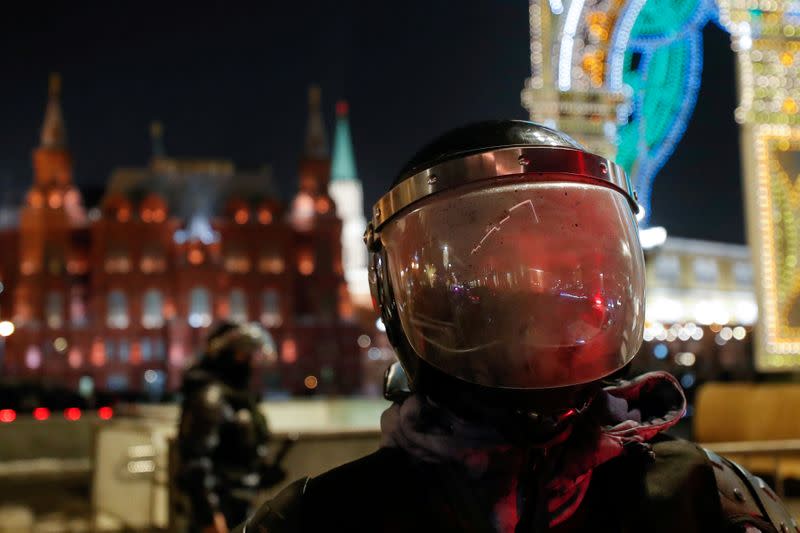By Maria Tsvetkova and Gleb Stolyarov
MOSCOW (Reuters) – Russia’s feared riot police have launched an online recruitment advertising campaign in the weeks since protests broke out across the country over the arrest of Kremlin critic Alexei Navalny.
The police forcibly dispersed tens of thousands of people who participated in three protests across Russia, which took place in January and early February, when Navalny returned from Germany to the country and was later imprisoned for two and a half years.
Since then, the riot police have announced hundreds of times for jobs on recruitment sites like HH.ru, run by the Headhunter Group, Avito and Superjob.ru. A Reuters analysis of data provided by some of the recruiting companies suggests that the blitz ad has gone far beyond any similar initiative in recent years.
Russian National Guard OMON units, working on protests across Russia, posted for jobs at the Headhunter 1,607 times from January 24 to February 24. That compared to just 151 job ads in the same period last year.
In the same month, Moscow’s main riot police unit, the Second Special Regiment, also posted for jobs 608 times at the Headhunter, against 11 during the past year.
“No experience is necessary,” said a job description for snipers from the Second Special Regiment on the Headhunter page, promising candidates a monthly salary of up to 70,000 rubles ($ 944.67).
The announcement was first posted on the Headhunter’s website on February 21 and republished 100 times in four days, the Headhunter’s press office told Reuters.
Russia’s Ministry of Internal Affairs did not respond to a request for comment. The press service of the Russian National Guard said the posting of job advertisements was “business as usual” and did not analyze whether the number of advertisements was increasing or not.
“WE HAVE A GREAT RECRUITMENT MOVEMENT”
In Avito, the number of riot police jobs posted between 26 January and 25 February was 3.7 times higher than in the same period last year and the number of responses increased 5.1 times, according to data that the company shared with Reuters.
Two OMON officials contacted by phone said the recruitment campaign was not linked to protests, but reflected the need to replace people who left the service with new opportunities. Eight officials from the Second Special Regiment confirmed that the campaign was larger than normal.
“We have a big recruiting campaign,” one of them told Reuters.
Another executive said that the intensification of hiring occurred after the decision made about two years ago to expand the staff.
($ 1 = 74,1000 rubles)
(Reporting by Maria Tsvetkova and Gleb Stolyarov; Editing by Andrew Osborn and Peter Graff)
